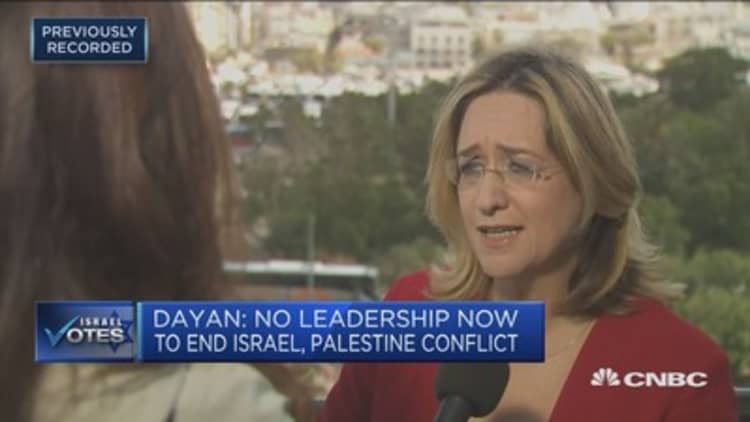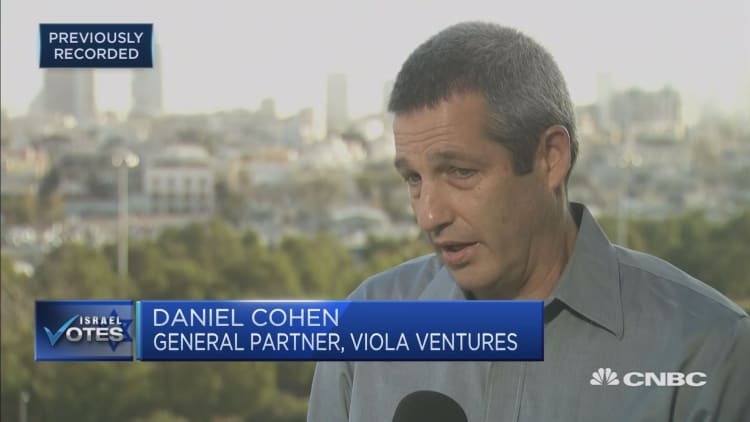
Benjamin Netanyahu's win in Israeli elections has triggered fears that his right-wing coalition may seize control of the disputed territory of the West Bank and its population of 2.6 million Palestinians.
Netanyahu has won his fifth term as Israel's Prime Minister, ringing in a victory for the country's right wing and religious community and threatening an even more fraught relationship with the Palestinians.
News coverage carried on well into the early morning hours of Wednesday, with leaders of both major parties declaring victory at various points as Netanyahu's right-wing Likud party remained neck-and-neck with rival Benny Gantz's center-right Blue and White party for seats in Israel's Knesset.
But despite tied numbers for the two parties on Wednesday morning — 35 seats each, with 97 percent of votes counted — all that mattered was the strength of each side's coalitions and Netanyahu won that argument convincingly.
"This will be a very, very right wing government," Amos Hochstein, a former U.S. diplomat and Obama administration official, told CNBC via phone on Wednesday.
"This is a decisive and massive election victory for Netanyahu, a decisive election for the right wing in Israel. It's not a close election — not even a little bit close."
As no major party has ever won a majority in the 120-seat Knesset, Netanyahu and Gantz had to rely on the smaller parties in their coalitions winning enough votes to tip their group over the halfway mark and win a majority of seats.
Gantz, despite early enthusiasm for his newly formed party, led by three former army chiefs of staff, failed to achieve that. The right wing and religious parties in the Likud-led coalition won more seats than the left, centrist and Arab parties combined.
The combination of last night and the Trump administration is the final end of the two-state solution. It’s done. It’s over.Amos HochsteinFormer U.S. diplomat and Obama administration official
Observers noted the low turnout of Arab Israeli voters, who comprise some 20 percent of the country's population. But their turnout would not have made a huge difference, Hochstein said.
"The real issue here is that the country's identity has been shifting for 20 years further to become demographically more right wing and more religious. And that trend is likely to continue and go further to the right, because demographically, that's what's growing."
Destroying a two-state solution
Israeli voters "have said no to peace and yes to the occupation," Saeb Erekat, chief Palestinian negotiator, said Tuesday night.
Netanyahu's tenure, which this summer will become the longest in the country's history, has seen Israel take an increasingly hard line on the Occupied Palestinian territories, expanding Israeli settlements into the West Bank that have been designated by the UN as illegal under international law.
Thanks to enthusiastic support from the Trump administration, Netanyahu has been emboldened to pursue right-wing policies — he now says that if he wins, he will annex the West Bank, home to around 2.5 million Palestinians. Gantz called this pledge "irresponsible."
While many observers brushed it off as campaign rhetoric, the Trump administration's unwavering support makes this a real possibility, believes Jake Walles, who served as U.S. consul general in Jerusalem from 2005 to 2009 and is now a fellow at the Carnegie Endowment for International Peace.
"A nnexation in the West Bank, which may get support from the Trump Administration, would probably set in motion a series of events that would finally destroy the possibility of a two state solution," Walles told CNBC on Wednesday.
The U.S. under Trump, in a stark rejection of policy norms, has already recognized Israel's annexation of the Golan Heights and the status of Jerusalem as Israel's capital, issues that had been previously regarded by the international community as subject to negotiation between the Israelis and Palestinians.
And Secretary of State Mike Pompeo, addressing a congressional hearing Tuesday, refused to say how the U.S. would respond to an Israeli annexation of the West Bank — potentially reversing more than 60 years of U.S. policy that rejects annexations as illegal land-grabs. He also refused to reaffirm U.S. support for the two-state solution.
"The combination of last night and the Trump administration is the final end of the two-state solution," Hochstein said. "It's done. It's over."
The UN classifies Israel as an occupier state over the Palestinian territories, whose occupations following the 1967 Six-Day War are still considered in violation of international law. More than 1.5 million Palestinians live in refugee camps across the Middle East today.
Corruption and the economy
Other issues important to voters were the economy and corruption. Netanyahu has been dogged by allegations of corruption and bribery, with Israeli police saying he accepted some $300,000 in bribes over the last decade.
The looming indictment for Netanyahu didn't deprive him of victory, but these allegations could now play into how he conducts his foreign policy.
"(In) a narrow right wing government, Netanyahu's legal problems will make him more dependent on his coalition partners, and they will press him to implement a hard right agenda, including his election promise on annexation in the West Bank," Walles said.

Young Israelis have also lamented rising living costs and wealth inequality, which the OECD says is among the highest in the world.
But for Israel's booming tech-driven economy, investors are comfortable that business will continue as usual.
"I don't think the elections in Israel really have any impact on that," Daniel Cohen, general partner at Israeli tech investment firm Viola Ventures, which oversees $3 billion in assets, told CNBC's Hadley Gamble. Israel's gross domestic product has increased by 70 percent since Netanyahu's premiership began in 2009.
"All the startups sell into the global markets, we're much more affected by what's happening in the Nasdaq than what's happening in the political scene," Cohen said.
Risks of heightened violence
Hochstein and others warn of heightened violence as tensions escalate and Hamas, the U.S.-designated terrorist group governing the Gaza Strip, takes advantage of the increasing desperation of Palestinians who see no prospect for their futures.
"The issue is when does the next war start, not if, and the difference will be that the next round of violence will not be restricted to Gaza alone — it will be Gaza plus West Bank, so it will be an all-out conflict where Israeli Arabs may join in in some places," Hochstein warned.
"We don't know when the next round of violence will start, but it will be significantly more severe."


